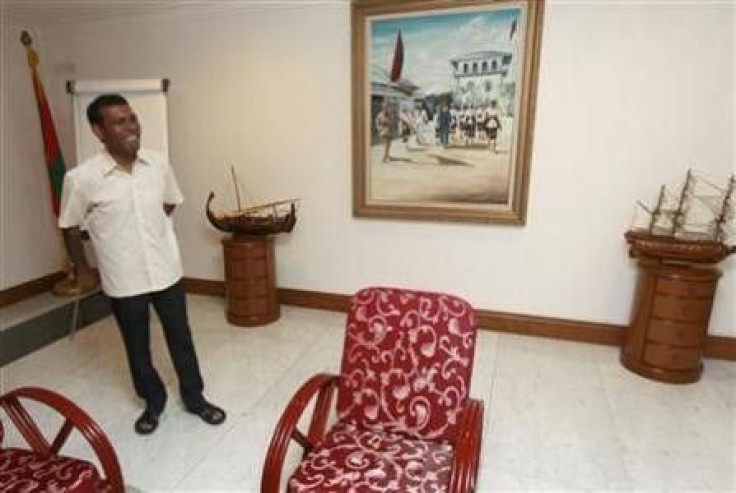Maldives President Quits; Suspects Coup

President Mohamed Nasheed of the Maldives, widely credited with bringing democracy to the hideaway resort islands, resigned on Tuesday after weeks of opposition protests erupted into a police mutiny and what an aide said amounted to a coup.
Mohamed Nasheed
Nasheed handed power over the Indian Ocean archipelago to Vice-President Mohamed Waheed Hassan Manik, who was sworn in in the afternoon, explaining that continuing in office would result in his having to use force against the people.
I resign because I am not a person who wishes to rule with the use of power, he said in a televised address. I believe that if the government were to remain in power it would require the use of force which would harm many citizens. I resign because I believe that if the government continues to stay in power, it is very likely that we may face foreign influences.
It was not immediately clear to what influences he was referring. India helped foil a coup on the islands in 1988 by sending a battalion of soldiers to back the government.
A spokesman for India's Foreign Ministry, Syed Akbaruddin, said the rebellion was an internal matter of the Maldives to be resolved by the Maldives.
Nasheed swept to victory in 2008, pledging to bring full democracy to the low-lying islands and speaking out passionately on the dangers of climate change and rising sea levels.
But he drew opposition fire for his arrest of a judge he accused of being in the pocket of his predecessor, Maumoon Abdul Gayoom, who ruled for 30 years. Protests at the arrest set off a constitutional crisis that had Nasheed defending himself against accusations of acting like a dictator.
It's a coup, I am afraid, an official at Nasheed's office said, asking not to be named. The police and Gayoom's people as well as some elements in the military have forced the president Nasheed to resign. According to my book it's a coup.
Overnight, vandals attacked the lobby of the opposition-linked VTV TV station, witnesses said, while mutinying police attacked and burnt the main rallying point of Nasheed's Maldives Democratic Party before later taking over the state broadcaster MNBC and renaming it TV Maldives.
On Tuesday, soldiers fired teargas at police and demonstrators who besieged the Maldives National Defence Force headquarters in Republic Square.
Later in the day, scores of demonstrators stood outside the nearby president's office chanting Gayoom! Gayoom!.
SCRAMBLE FOR POSITION
Gayoom's opposition Progressive Party of the Maldives accused the military of firing rubber bullets at protesters and a party spokesman, Mohamed Hussain Mundhu Shareef, said loads of people were injured. He gave no specifics.
An official close to the president denied the government had used rubber bullets, but confirmed that about three dozen police officers defied orders overnight and attacked a ruling party facility.
This follows Gayoom's party calling for the overthrow of the Maldives' first democratically elected government and for citizens to launch jihad against the president, said the official who declined to be identified.
The protests, and the scramble for position ahead of next year's presidential election, have seen parties adopting hardline Islamist rhetoric and accusing Nasheed of being anti-Islamic.
The trouble has also shown the longstanding rivalry between Gayoom and Nasheed, who was jailed in all for six years after being arrested 27 times by Gayoom's government while agitating for democracy.
The vice-president is expected to run a national unity government until the presidential election.
The trouble has been largely invisible to the 900,000 or so well-heeled tourists who come every year to visit desert islands swathed in aquamarine seas, ringed by white-sand beaches.
Most tourists are whisked straight to their island hideaway by seaplane or speedboat, where they are free to drink alcohol and get luxurious spa treatments, insulated from the everyday Maldives, a fully Islamic state where alcohol is outlawed and skimpy beachwear frowned upon.
Nasheed was famous for his pleas for help to stop the sea engulfing his nation and in 2009 even held a cabinet meeting underwater, ministers all wearing scuba gear, to publicise the problem.
An Asian diplomat serving in Male told Reuters on condition of anonymity: No one remembers the underwater cabinet meeting. They remember Judge Abdulla Mohamed, a reference to Nasheed having the military arrest the judge accused of being in Gayoom's pocket.
Meanwhile, Twitter user Alexander Brown said he was in the Maldives enjoying life.
Maldives government overthrowing (sic) and im watching a Vogue photo shoot infront of me on Four Seasons ... very strange world.
© Copyright Thomson Reuters 2024. All rights reserved.











